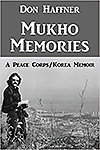Review — MUKHO MEMORIES by Don Haffner (Korea)
 Mukho Memories: A Peace Corps/Korea Memoir
Mukho Memories: A Peace Corps/Korea Memoir
by Don Haffner (Korea 1972–75)
Dog Ear Publishing
May 2017
406 pages
$20.00 (paperback), $9.99 (Kindle)
Reviewed by Clifford Garstang (Korea 1976–77)
•
MUKHO MEMORIES BY DON HAFFNER (Korea, 1972–75) is the fourth or fifth Peace Corps Korea memoir I’ve read. While the personalities of the authors make each distinct, these volumes (and likely Peace Corps memoirs about other countries of service as well) all tell roughly the same story: idealistic young American comes to an under-developed country, discovers the wonders and peculiarities of the place, and returns home forever changed by the experience.
As a Korea RPCV myself (I arrived in Korea a few months after Haffner left), my own memories are quite similar to Haffner’s: the anxiety of being outside the US for the first time, in a non-English speaking country, no less; the triple-whammy shock of new cuisine, new culture, and new customs; the challenge of in-country training, including intensive learning of a difficult language; the excitement and trepidation of settling into the work setting; the sense of isolation at the work site; the discomfort of occasionally rebellious digestion; the fondness for certain coworkers and fellow Volunteers and the disdain for others; the way time speeds up as your service draws to a close. It brings back wonderful memories to relive those experiences, even when they were painful, as some of them are for Haffner.
Haffner presents his experience in remarkable detail, complete with names and dates, despite the fact that he says he didn’t keep a diary. But along with the detail of his years of service, he also includes long — perhaps too long — sections about his life before and after Peace Corps and his summer home leave prior to his extension year. Because Haffner worked as the Resident Director of the Korea Branch of the Pearl S. Buck Foundation for most of the 1980s, a position that allowed him to observe closely the rapid development of Korea after his Peace Corps years, some of this material, while not strictly part of his Peace Corps memories, at least serves to support his reflections on the importance of his service.
Haffner’s love of teaching comes through loud and clear in these pages. He obviously thrived on the classroom experience and interactions with his students and co-workers in and out of school. And by his account he was also innovative, experimenting with Caleb Gattegno’s “Silent Way” method of teaching, the method which, by the time I entered training in 1976, had been adopted by Peace Corps Korea as the primary method of teaching Korean to Volunteers. (I loved learning that way; not everyone did.) Haffner’s positive outlook on his life in Korea is also refreshing. While he makes note of some rules he didn’t agree with (repeatedly told to cut his hair and shave his mustache, he refused until he was convinced he was causing trouble for other Volunteers), he also chides fellow Volunteers for being overly critical of Korea and Koreans. (I have to agree; a positive outlook made living and working under difficult circumstances much more bearable.)
Having said that, there are two things I find disturbing about Mukho Memories. First is its sexist slant. While the 1970s were unquestionably a different time, the references to Haffner’s female fellow Volunteers as “gals” and “ladies” strikes me as odd and condescending. And he seems too quick to dismiss their complaints about how the male Volunteers treated them. Haffner is also disarmingly forthright about his pursuit of various Korean women, with only a casual concern expressed for the reputation of those women in socially conservative Korea. Second, while Haffner mostly uses false surnames for Americans on Peace Corps staff and for other Volunteers, this doesn’t always disguise their identities. Some of Haffner’s assessments of staff and Volunteers are blunt and disparaging, and will most likely be embarrassing to the individuals concerned. Again, this seems like an odd choice.
Interestingly, the book includes an account of a 2011 return visit to Korea sponsored by the Korean government as a way of thanking Peace Corps Volunteers for their contributions to Korea’s development. I was also on that trip and enjoyed the same entertainments that Haffner and his wife did, although I only have a vague memory of meeting them.
Overall, the memoir is informative and charming. The reader will especially appreciate the portrait of an enthusiastic young man who sees the world and his new life through a musical filter, often breaking into song (complete with title, composer, and original performer) as a way to process a new experience as well as his fond memories.
•
Clifford Garstang (Korea, 1976-77) taught English at Chonbuk National University in Chonju, Korea. He is the author of a collection of short stories, In An Uncharted Country, which won the 2010 Maria Thomas Fiction Award from Peace Corps Writers, and a novel in stories, What the Zhang Boys Know, which won the Library of Virginia Literary Award for Fiction. He is also the editor of Everywhere Stories: Short Fiction from a Small Planet, an anthology series featuring international stories, including work by several RPCVs.
No comments yet.
Add your comment